Press releases
Winners of Bogdanovich poem translation contest honored in Minsk

MINSK, 2 April (BelTA) - The winners of the contest for the best literary translation of the previously unknown poem Distichs by Maksim Bogdanovich from Russian into Belarusian were honored in a ceremony at the National Press Center of Belarus on 2 April, BelTA learned.
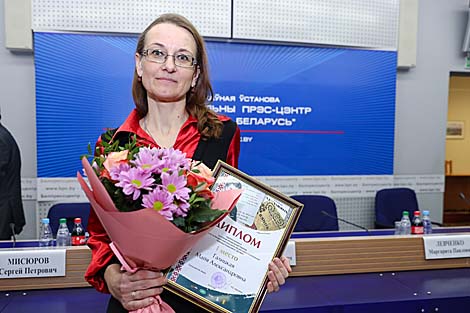 Maya Galitskaya from Buda-Koshelevo, Gomel Oblast was awarded the first prize. She said she fell in love with Maksim Bogdanovich’s poetry when a student. When she learned about the contest she immediately decided to participate. She said she made the translation in one day and didn't expect to become a winner. “Literary translation contests are always important. Firstly, they show the synthesis of languages. Secondly, such contests give an opportunity to reconnect with history and roots,” said Maya Galitskaya.
Maya Galitskaya from Buda-Koshelevo, Gomel Oblast was awarded the first prize. She said she fell in love with Maksim Bogdanovich’s poetry when a student. When she learned about the contest she immediately decided to participate. She said she made the translation in one day and didn't expect to become a winner. “Literary translation contests are always important. Firstly, they show the synthesis of languages. Secondly, such contests give an opportunity to reconnect with history and roots,” said Maya Galitskaya.
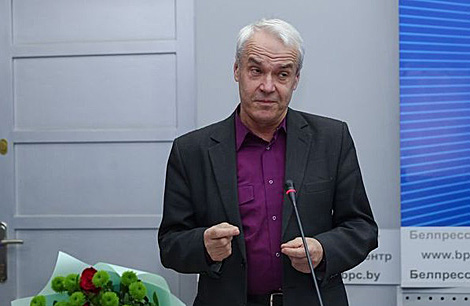 The second prize went to Viktor Lovgach from Minsk who was one of the first to send his translation to the contest. “I imagined the difficult life of our poet and did the translation in literally seven minutes. It is very nice that it was acknowledged by the jury. I hope readers will enjoy it too,” he said.
The second prize went to Viktor Lovgach from Minsk who was one of the first to send his translation to the contest. “I imagined the difficult life of our poet and did the translation in literally seven minutes. It is very nice that it was acknowledged by the jury. I hope readers will enjoy it too,” he said.
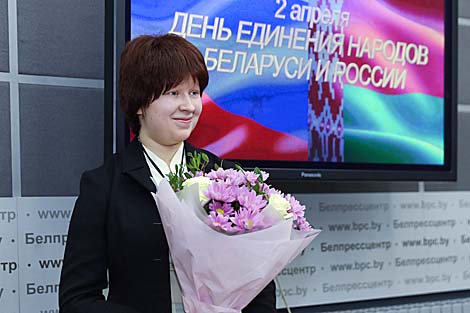 Bronze went to Oksana Gavrilik from the agro-town Ilya, Vileika District, Minsk Oblast. Nadezhda Lazerko from Borisov got an encouraging prize.
Bronze went to Oksana Gavrilik from the agro-town Ilya, Vileika District, Minsk Oblast. Nadezhda Lazerko from Borisov got an encouraging prize.
The Union State Permanent Committee awarded all winners with book sets. State Secretary of the Union State Grigory Rapota thanked the winners for their participation. He noted that Maksim Bogdanovich lived in Yaroslavl. Since his early childhood he spoke the Belarusian language and wrote poetry in Belarusian. “This is a unique phenomenon: living in the Russian-speaking environment he had so much love for his native tongue. It is great,” he added.
All in all, 442 entries were sent on 18 January - 18 March. “Over 80% of them were submitted by women and girls. Our women are always active and lyrical. We received entries from all over Belarus. What is the most heartening for me is a great number of young authors aged 16, 17 and 18. The youth was really curious to find out how Maksim Bogdanovich’s poetry will sound in Belarusian and this is great,” BelTA Director General Irina Akulovich said.
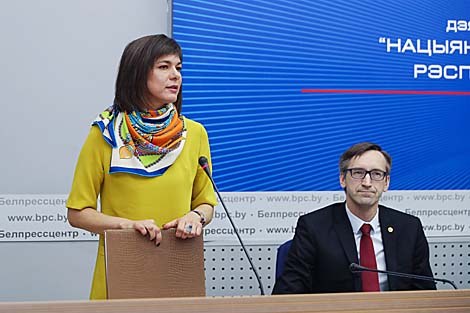 According to the chairperson of the jury, the absence of translation experience had an impact on the quality of translation: many authors made word-for-word translations and lacked lyricism, rhyme, tempo and even sense. “The most skillful works were sent by older people who probably have more experience and better understanding of life, they are more well-read and have a broader vocabulary, therefore their translations came out more melodious and fascinating,” Irina Akulovich said.
According to the chairperson of the jury, the absence of translation experience had an impact on the quality of translation: many authors made word-for-word translations and lacked lyricism, rhyme, tempo and even sense. “The most skillful works were sent by older people who probably have more experience and better understanding of life, they are more well-read and have a broader vocabulary, therefore their translations came out more melodious and fascinating,” Irina Akulovich said.
A previously unknown poem by Maksim Bogdanovich was discovered last November by Darya Moskovskaya, Deputy Director of the Gorky Institute of World Literature of the Russian Academy of Sciences. She found the writer’s student notebook of 1913-1914 in the archives. Belarusian researchers searched for this notebook for almost 100 years as it was mentioned in the correspondence with Maksim Gorky. All this time it was kept in the wrong folder in the archives. The unknown poem Distiches was written in Russian. Maksim Bogdanovich pointed out that this was a translation from Belarusian. However, the original work has never been published and neither has its Russian version.
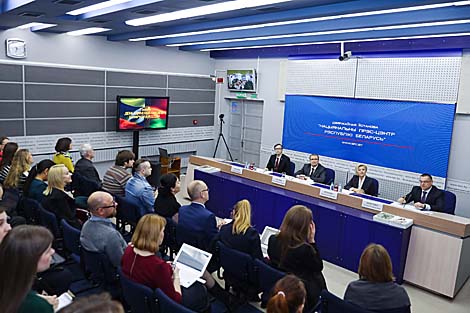 State Secretary of the Union State Grigory Rapota suggested organizing a competition for the best translation of the poem into Belarusian. The Belarusian Telegraph Agency BelTA supported the initiative and held a literary competition to strengthen cultural ties, interethnic peace and harmony, promote the development and support of the Belarusian national literature, popularize the Belarusian language and draw attention to the work of Maksim Bogdanovich, and support talented translators and writers.
State Secretary of the Union State Grigory Rapota suggested organizing a competition for the best translation of the poem into Belarusian. The Belarusian Telegraph Agency BelTA supported the initiative and held a literary competition to strengthen cultural ties, interethnic peace and harmony, promote the development and support of the Belarusian national literature, popularize the Belarusian language and draw attention to the work of Maksim Bogdanovich, and support talented translators and writers.
The project was organized by the Union State Permanent Committee, the Belarusian Telegraph Agency BelTA, the Gorky Institute of World Literature of the Russian Academy of Sciences, the State Museum of the Belarusian Literature History (Maksim Bogdanovich Literary Museum subsidiary), and the Union of Writers of Belarus.







 print version
print version make home page
make home page add to bookmarks
add to bookmarks

